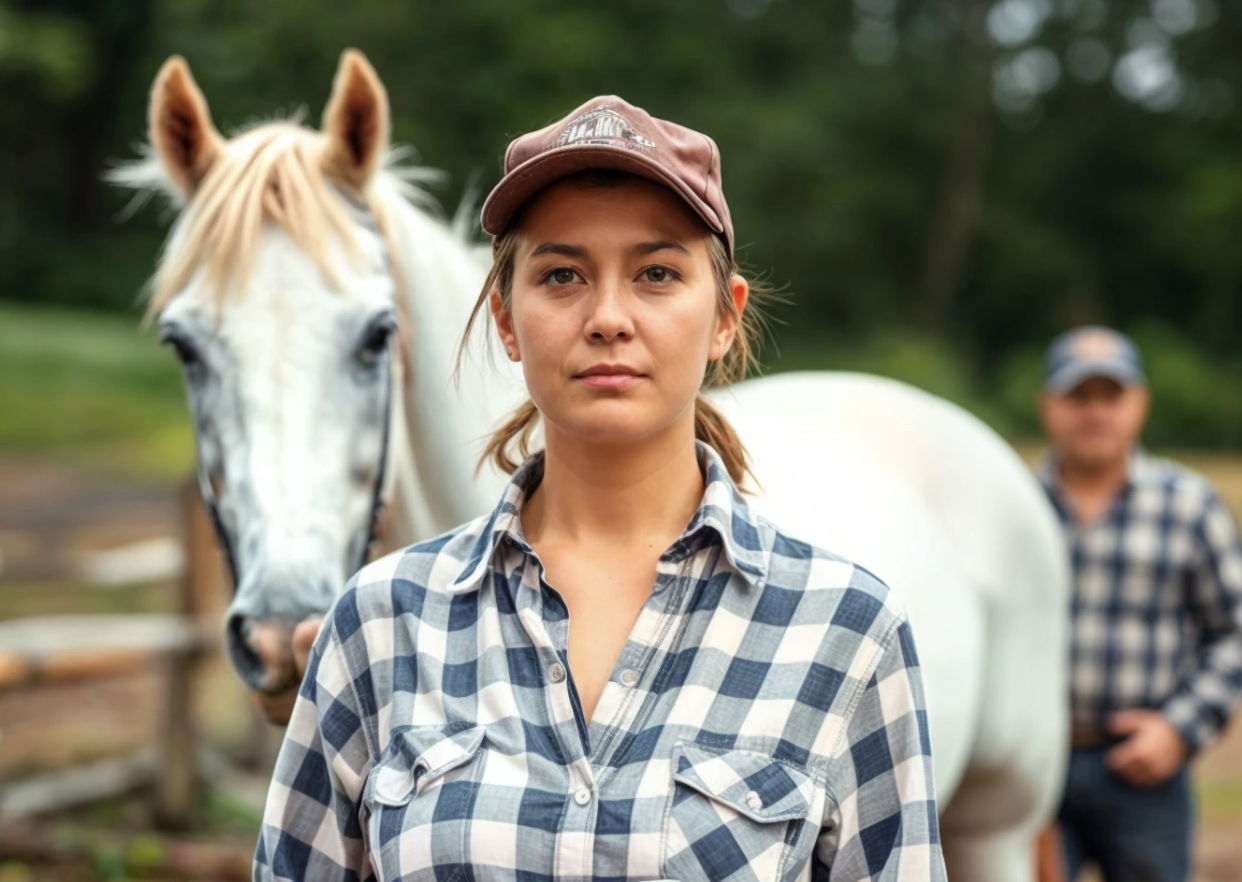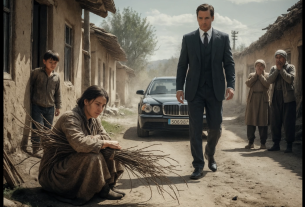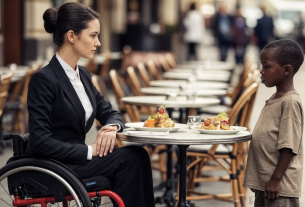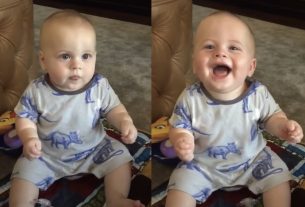The grass beneath his feet cracked like fragile glass shattered under the weight of time, and the morning air, saturated with moisture and the scent of damp earth, seemed to breathe the very essence of life—wet, dark, yet alive. The sun was just beginning to break through the mist that spread across the field like milk on a clay plate. Ivan Petrovich Kovalyov stood by the old barn, his figure a shadow amid the morning light, stern as an ancient oak, with roots grown deep into this land. He slowly wiped his hands on the coarse fabric of his apron, soaked with sweat, oil, and the smell of hard work. Every movement was precise, honed over years, as if time itself had taught him how to live—not hurriedly, but without mercy toward weakness.
His eyes, piercing like two steel needles, were used to noticing what others did not see: a crack in the roof before the rain, a cow’s painful glance before it limps, a tremor in the hand of a man hiding fear. Today his gaze swept over the yard like a well-memorized map. Everything seemed familiar: chickens scratching near the fence, a rooster strutting like a general, the black dog lazily raising its head. But something disrupted this picture. Disrupted it insistently, like a ringing alarm in the ears.
Svetlana, his worker, was walking toward the kitchen carrying a bucket of water. Her steps were unsteady, as if she were balancing on the edge of an abyss. Her left foot barely touched the ground—step, pause, almost a limp. Ivan frowned. He knew every crack in this yard, every bump, every stone. He would have noticed if she had fallen. But she did not fall. Something was wrong. Completely wrong.
He moved forward slowly, as if in no hurry, but each step was resolute. The morning chill clung to his skin, seeped under his shirt, burned his neck, but he did not shiver. Cold was a familiar enemy he fought every spring. He stopped at the porch, watching. Svetlana, sensing his gaze, straightened sharply—not like a person, but like a soldier at attention, stiff as a string, as if trying to disappear into her own shadow. Her face, usually calm like a pond on a windless day, was now tense, like a drawn bowstring. Her eyes darted toward the house, as if searching for shelter, afraid the walls might speak.
Ivan was silent. He was not a man of words. He was a man of deeds. But at that moment, silence spoke louder than a scream.
The sleeves of her sweater, unnaturally long even on this warm day when the sun was already starting to burn, suddenly rolled up as she set down the bucket. And then he saw it. On her wrist, like a black mark, like a curse, spread a bruise—dark, ominous, as if blood beneath the skin had frozen into a blot left by fate. Ivan felt something clench inside him, as if someone squeezed his heart with an icy hand. To ask? Not to ask? The question hung in the air like lightning before a storm.
“Svetlana, are you alright?” he asked, his voice steady like a ruler, but inside—a storm. He knew he was not asking about the weather.
She flinched as if struck. Smiled—but the smile was crooked, like cracked glass through which the sun was no longer visible.
“Yes, I stumbled,” she answered, averting her eyes. “On the porch.”
Ivan nodded but did not believe her. Not a single word. He knew that porch like the back of his hand. The boards were sturdy, not loose, not rotten. Nobody ever stumbled on it. Never. Svetlana disappeared into the kitchen, and he remained standing, feeling the anxiety—cold and heavy like mercury—spread across his chest, veins, and bones. Something was wrong. Completely wrong.
He was used to trusting his instincts. They saved his cow from dying, warned him of roof breaks before the rain, told him when the ground needed sowing. And now his instinct screamed like a fire siren: this was not an accident. This was violence.
Evening fell on the village like a heavy cloak. Silence was thick as honey, but something crackled within it. Ivan sat by the barn, fixing a cart, but his hands moved mechanically. His eyes were fixed on the edge of the property, on Svetlana’s house. And suddenly—a roar. Sharp, harsh, like a pack of dogs barking, like a gunshot in the night. A motorcycle, black as a shadow, burst into the yard, stopping by her house like a master, like a conqueror.
A face appeared from under the helmet. Sergey Belov. The local police officer. A man with a heavy gaze, with eyes that held not a drop of light. He walked around the village as if it were his domain, knocked on doors without knocking, demanded reports, fines, obedience. He was not a protector but a tyrant. And now he entered Svetlana’s house without knocking, without asking, as if she were not a person but an object.
Ivan froze. He saw Svetlana standing in the doorway, her shoulders tense like cables, as if waiting for a blow. Like an animal trained to take beatings. He saw her shrink, her shadow growing smaller, as if someone had squeezed the soul out of her.
When Belov left, Svetlana came out onto the porch. She held the doorframe like a drowning person clutching a log. Her movements were slow, cautious, like a wounded beast afraid of every step. Ivan put down his hammer. Something inside him broke. Anger, deep and ancient as the earth itself, began to smolder like embers in a stove. He was not a hero. He was a simple man. But he knew: silence was complicity.
The next morning smelled of freshly cut grass, dew, and bread from the neighbor’s oven. But for Ivan it was heavy, like leaden skies before a storm. He watched Svetlana digging in the garden. Her movements were slow, as if every swing of the shovel brought pain to her body. She tried to look strong, but weakness showed through like water seeping through cracks.
And again—the sleeves. Long. Too long. They hid her wrists, but on her neck, where the collar was slightly turned back, as if fate itself had revealed the truth—a new bruise. Dark as night. Ivan gripped the shovel so tightly the wood cut into his palms, leaving marks like scars. He could no longer remain silent. Not anymore.
“Svetlana, tell the truth,” he said, stepping closer. His voice was quiet but firm as stone. “It’s not the porch.”
She froze. Like a caught-off-guard animal. Her fingers, thin as aspen branches, clenched the hoe. Her eyes, dark and tired like lakes after a long drought, fixed on the ground.
“I told you… I fell,” she whispered. Her voice trembled like a leaf in the wind before a storm.
Ivan shook his head. He knew that tone. That’s how people speak when afraid. That’s how they speak when they know: if you tell the truth, it will be worse. He had seen that fear in the eyes of cows driven to slaughter. And now he saw it in the eyes of a woman who worked his land, who fed his home.
His gaze fell on the road. On the place where Belov’s motorcycle had roared yesterday. Ivan squinted. Everything fit together. Every detail was like a brick in a wall he was beginning to see.
He began to watch. During the day, checking livestock, he secretly observed Svetlana. She worked silently, without complaint, without asking for help. But her movements were stiff, as if afraid of sudden motion, as if every gesture could cause pain. In the evening, sitting by the window, he saw the motorcycle approach her house again. Belov got off, entered without knocking. The lights in the windows went out. Ivan gripped the windowsill, feeling the wood creak under his fingers as if the house itself groaned in helplessness. He could not just watch. He had no right.
The next day he found a rag by Svetlana’s porch. Rough, dark blue, with torn edges, as if ripped off in a hurry. Ivan picked it up. Remembered. Belov had a jacket—just like that, blue with a worn sleeve. This rag was part of it. Evidence. Proof. He shoved it in his pocket, feeling determination ignite inside like fire. He was not a hero. But duty was not an empty word. Svetlana was under his protection. And he could not betray this land, these people, this honor.
He began to ask. Carefully, as if casually. From old Marya, who lived two houses down, he borrowed some salt. Then—between other things—he asked about Belov.
“He scares everyone here,” she said, squinting as if from the sun, but in her eyes was a shadow of fear. “Fines, threats, extortion. And Svetka, it seems, he’s really gotten to. They say he demands… not only money.”
Ivan nodded. The truth, like a puzzle, was forming a complete picture. Belov was not just a police officer. He was a predator. And Svetlana was his victim. But power does not make a man righteous. Ivan knew that. It was time to act.
The morning at the village council smelled of dust, old papers, and fear. Ivan walked through the village, feeling the neighbors’ eyes on him. Some looked away. Some watched with hope. His steps, heavy as hammer blows, clattered on the gravel. He rarely came to Glubokoye’s center without reason. And today there was a reason—as sharp as a knife in the heart.
Belov stood by the council building. Smoking. Speaking loudly as if he wanted everyone to hear. Boasting how he had “dealt with” a guy who stole firewood. Talking about power, about authority, about how he “kept order.” Ivan stopped. Blood pounded in his temples like drums. He stepped forward.
“I know what you’re doing,” he said, looking straight into Belov’s eyes. “With Svetlana.”
Belov froze. Then laughed. The laughter was icy, like a winter wind.
“What are you talking about, old man? Mind your cows.”
Ivan did not back down. He pulled the rag from his pocket. Held it like a banner.
“This is yours,” he said. “Found it by Svetlana’s house. And I saw her bruises.”
The crowd murmured. People who had been silent for years suddenly spoke. Someone shouted about fines. Another woman, Nina, told how Belov threatened her son. Ivan stood feeling the truth, like a river, breaking through the dam. At that moment, Mikhail Ivanovich, the chairman, appeared on the porch. His face was like an old oak, furrowed by time.
“What’s going on here?”
Ivan repeated everything. About the bruises. About the motorcycle. About the rag. About fear. About silence. People began to talk. Voices rose like wind before a storm. Belov tried to shout, but his words drowned out. Mikhail Ivanovich raised his hand.
“I will call the investigator. We will sort this out.”
Belov turned pale. His mask fell. His power collapsed like a house of cards.
The investigator arrived in the morning. Svetlana, trembling but supported by Ivan, told everything. How Belov blackmailed her. How he threatened to evict her. How he demanded submission. How she fled the city from one nightmare—and ended up in another. Her voice was quiet but firm. Like the first ray of sun after a long night.
Complaints poured in like stones. Belov was suspended. Glubokoye grew quieter. But this was a new silence. Not oppressive. Calm. Like the breathing of a sleeping child.
The evening smelled of hay, coolness, and freedom. Ivan sat on a bench. Svetlana beside him. For the first time in a long while, her shoulders were not tense. Her eyes, dark as lakes under the stars, were calm.
“Thank you, Ivan Petrovich,” she said. “I was afraid no one would believe me.”
He nodded. Said little. But he knew: she was safe.
“Stay,” he said. “There’s plenty of work.”
She smiled. Timidly. Like the first snow. Like the beginning of a new life.
They sat silently, watching the sun sink below the horizon. The village was quiet. But it was a new quiet. Ivan looked out over the fields. Something had changed. He was not a hero. But he understood: one step, one word—and the world could become more honest.
Glubokoye came alive.
Like after a long winter.
And he knew—he had done the right thing.



